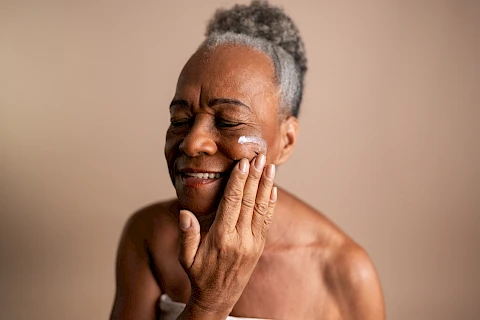
As winter approaches, caring for your skin becomes even more crucial. Cold weather is generally harsh on the skin, but seniors and those with diabetes, eczema, or psoriasis must pay special attention to winter skin care to avoid discomfort and more severe problems. Learn how to protect your skin in the winter.
Recognizing Winter Skin Challenges
Cold weather significantly impacts your skin, which can mean dry, itchy, and sometimes cracked skin for seniors. Winter air is typically drier, meaning less moisture is available to keep skin hydrated. Health conditions like diabetes may cause reduced sensitivity and increase the risk of skin infections. Due to the dry, cold air, eczema and psoriasis can also flare up more frequently during winter. Acknowledging these challenges is the first step in protecting your skin during the chilly months.
Choosing the Right Skin Care Products
Selecting the right skin care products makes a big difference in managing skin health during winter. Opt for rich, creamy moisturizers that help replenish moisture without irritating the skin. Look for ingredients like hyaluronic acid, glycerin, or ceramides. For cleansers, choose gentle, non-foaming options that don't strip the skin of natural oils.
Fragrance-free and hypoallergenic products are less likely to cause irritation or allergic reactions, which is essential for sensitive skin. For those with diabetes, consider moisturizers that focus on healing and preventing skin breaks for eczema or psoriasis; products containing colloidal oatmeal or aloe vera calm flare-ups.
Managing Symptoms Effectively
A daily skincare routine is vital to keeping skin healthy and alleviating symptoms. Apply moisturizer immediately after bathing while the skin is still damp. This step helps lock in moisture. Avoid hot showers, which further dry out the skin. Staying hydrated by drinking water throughout the day can also improve skin health.
Eating omega-3-rich foods like salmon and flaxseeds or taking supplements supports healthier skin. Always check with a physician before adding supplements to avoid contraindications with prescribed medications.
Contact a healthcare professional if your skin becomes red, swollen, or extremely painful. This can help prevent more serious issues, like infections.
Protecting Skin from Harsh Winter Elements
Taking extra precautions helps protect your skin from the harsh winter environment. To keep warm, wear soft, layered clothing. Scarves, hats, and gloves protect exposed skin from wind and cold.
Always apply sunscreen, even on cloudy winter days. The sun's UV rays can still harm your skin in the colder months.
Use a humidifier in your home to maintain moisture in the air. This moisture will help prevent your skin from drying out excessively.
Winter Skin Care Support for Seniors with Health Conditions
Winter skin care is essential for seniors, particularly those with diabetes, eczema, and psoriasis. You can manage these challenges by choosing the right products, maintaining a consistent skincare routine, and protecting your skin from the elements.
If you reside in Ellicott City, Westminster, Mount Airy, Finksbury, or Taneytown and need personalized help, contact us at Senior Helpers Westminster. Our professional team would love to discuss our services for seniors and their caregivers, such as Personal Care and Companion Care.